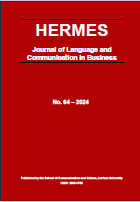Management de Projet en Linguistique Appliquée.
Méthode et Cas d’Usage
DOI:
https://doi.org/10.7146/hjlcb.vi64.132534Keywords:
Project Management, Applied Linguistics, Corpus Linguistics, Discourse Analysis, PatternsAbstract
This article examines the application of project management principles in the field of applied linguistics, using the author's doctoral research experience as a case study. It explores the challenges, strategies, and lessons learned in managing linguistic research projects. By highlighting best practices and encountered obstacles, the study aims to enhance understanding of project management within applied linguistics. The insights provided are valuable for researchers and practitioners navigating the complexities of linguistic research endeavors.
References
Aubry, C. (2013). Scrum - 3e éd.: Le guide pratique de la méthode agile la plus populaire. Dunod.
Bach, M. (2017). Prototypicité discursive dans les discours de vente du vin. Étude contrastive français-allemand en Bourgogne et en Rhénanie-Palatinat [Mémoire de M2]. Université de Bourgogne.
Bach, M. (2022). Sémantique discursive cognitive. Frames et constructions des discours de vente du vin en Autriche. Peter Lang.
Bach, M. (2023). Construire le sens à travers les connaissances spécialisées. L’exemple des discours de vente du vin. ELAD-SILDA 8. DOI: 10.35562/elad-silda.1363.
Brahim, W. (2016). L’approche processus. I2D - Information, données & documents 53(4), 37–38.
Busse, D. (2012). Frame-Semantik. Ein Kompendium. de Gruyter.
Busse, D. (2018). Diskurs und Wissensrahmen. In: I. Warnke (ed.), Handbuch Diskurs (3–29). de Gruyter.
Diessel, H. 2017). Usage-Based Linguistics. Oxford Linguistics. https://doi.org/10.1093/acrefore/9780199384655.013.363.
Diessel, H. (2019). The Grammar Network. How Linguistic Structure is Shaped by Language Use. Cambridge University Press.
Fernandez, V., Houy, T., & Khalil, C. (2013). Les méthodes agiles en développement informatique. Presses des Mines.
Foucault, M. (2015). Œuvres. Tome 1-2. Gallimard
Glaser, B. & Strauss, A. (2006). The Discovery of Grounded Theory. Strategies for Qualitative Research. Aldine Transaction.
Goldberg, A. (2019). Explain me this. Creativity, Competition, and the Partial Productivity of Constructions. Princeton University Press.
Heagney, J. (2016). Fundamentals of Project Management. AMACOM.
Merten, M.-L. (2018). Literater Sprachausbau kognitiv-funktional. Funktionswort-Konstruktionen in der historischen Rechtsschriftlichkeit. de Gruyter.
Messager, V. (2013). Gestion de projet agile: avec Scrum, Lean, eXtreme Programming... Eyrolles.
Östman, J. (2005). Construction Discourse. A prolegomenon. In J. Östman & M. Fried (eds.), Construction Grammars: Cognitive grounding and theoretical extensions (121–144). Benjamins.
Pinto, J. K. (2020). Project Management. Achieving Competitive Advantage. Pearson.
von Polenz, P. (2008). Deutsche Satzsemantik. Grundbegriffe des Zwischen-den-Zeilen-Lesens. de Gruyter
Sambunjak, D., Cumpston, M., & Watts, C. (2017). Module 1: Introduction to conducting systematic reviews. In: Cochrane Interactive Learning: Conducting an intervention review. Cochrane. https://training.cochrane.org/interactivelearning/module-1-introduction-conducting-systematic-reviews.
Schutz-Balluff, S. (2018). Wissenswelt triuwe. Kollokationen – Semantisierung – Konzeptualisierung. Universitätsverlag Winter.
Spieß, C. (2011). Diskurshandlungen. Theorie und Methode linguistischer Diskursanalyse am Beispiel der Bioethikdebatte. de Gruyter.
Spitzmüller, J., & Warnke, I. (2011). Diskurslinguistik. Eine Einführung in Theorien und Methoden der transtextuellen Sprachanalyse. de Gruyter.
Tomasello, M. (2008). Origins of Human Communication. MIT Press.
Tomasello, M. (2019). Becoming Human: A Theory of Ontogeny. Harvard University Press.
Varga, S. (2020). Frames und Argumentation. Zur diskurssemantischen Operationalisierung von Frame-Relationen. Peter Lang.
Ziem, A. (2008). Frames und sprachliches Wissen. Kognitive Aspekte der semantischen Kompetenz. de Gruyter.
Ziem, A., & Lasch, A. (2015). Konstruktionsgrammatik IV. Konstruktionen als soziale Konventionen und kognitive Routinen. Stauffenburg.

Downloads
Published
How to Cite
Issue
Section
License
Copyright (c) 2024 Matthieu Bach

This work is licensed under a Creative Commons Attribution 4.0 International License.
Authors who publish with this journal agree to the following terms:
a. Authors retain copyright and grant the journal right of first publication with the work simultaneously licensed under a Creative Commons Attribution License that allows others to share the work with an acknowledgement of the work's authorship and initial publication in this journal.
b. Authors are able to enter into separate, additional contractual arrangements for the non-exclusive distribution of the journal's published version of the work (e.g., post it to an institutional repository or publish it in a book), with an acknowledgement of its initial publication in this journal.
c. Authors are permitted and encouraged to post their work online (e.g., in institutional repositories or on their website) prior to and during the submission process, as it can lead to productive exchanges, as well as earlier and greater citation of published work (See The Effect of Open Access).




